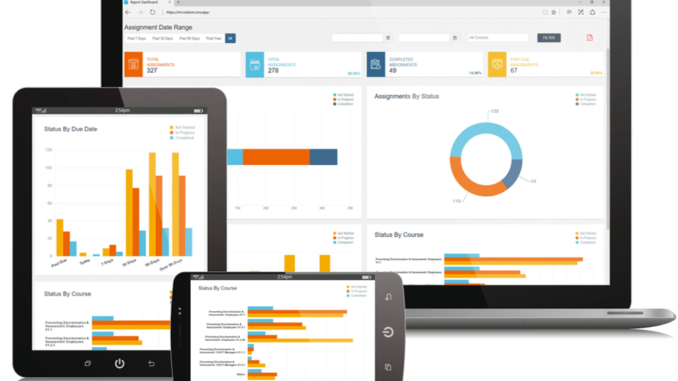
By Andrew Rawson, Co-founder and chief learning officer, Traliant - 10.21.2019
The second-year anniversary of the #MeToo movement marks significant changes—stronger state anti-harassment laws, greater awareness of unacceptable behavior in the workplace, and a growing demand for more effective approaches to preventing sexual harassment and creating a safe, respectful culture.
Changing behavior and workplace culture is a long-term commitment that needs the active support of leadership, along with effective policies, procedures and ongoing training. As restaurateurs consider ways to improve workplace conduct and culture, here are six training tips:
Provide training customized to the restaurant industry
Given the unique working environment of restaurants, sexual harassment training should feature video scenarios, graphics, examples, terminology, and branding that are relevant to restaurant employees and managers. One of the key takeaways from the Equal Employment Opportunity Commission’s Select Task Force on the Study of Harassment in the Workplace is that regular, interactive training tailored to the organization and its workforce is an essential step in effectively addressing and preventing workplace harassment.
Ensure training meets state requirements
The #MeToo movement has spurred a national trend of state and local anti-harassment laws. Bloomberg Business reports that one in five workers in the US now lives in a state that requires employers to offer sexual harassment training.
To date, New York, California, Connecticut, Illinois, Delaware and Maine have passed laws requiring employers to conduct regular sexual harassment prevention training. For New York employers, the training must be provided annually to all employees, including part-time and temporary employees, regardless of their immigration status. Connecticut employers with three or more employees must provide two hours of sexual harassment training, and all Connecticut employers must provide two hours of training to supervisors.
Starting January 1, 2020, Illinois employers must train all employees on an annual basis, and restaurants and bars are required to tailor the training to their working environment. The training deadline for California employers with five or more employees was recently extended to January 1, 2021. That’s when supervisors must complete two hours of training and nonsupervisory employees complete one hour of training, then be retrained every two years.

Leverage eLearning innovations
Innovations in eLearning strategies and tools are transforming online compliance training into an interactive, engaging learning experience. Rather than click through static slides and legal definitions, employees can learn about the different forms of harassment through realistic scenarios and other interactions that challenge them to make choices that aren’t always clear-cut.
New technologies are also making it easier to update training to reflect changes in rules and regulations, and to keep the content fresh so employees aren’t taking the same course year after year.

Focus training on behaviors
Effective sexual harassment training is behavior-based, focused on raising awareness of different types of unwelcome conduct, especially subtler forms, and how it affects not just targets but the entire organization. Incorporating topics such as diversity and inclusion and bystander intervention broadens the conversation about creating a positive workplace and encourages individuals to take action to stop misconduct and help prevent future incidents.
Enable staff to train anytime on any device
Restaurant employees often have long shifts and unpredictable hours that can make scheduling training difficult. Training that is mobile optimized for smartphones, tablets or laptops provides the flexibility they need to fit training in between shifts or during off-peak hours.
Mobile technology also benefits HR managers and administrators, who can use their devices to assign training courses, send out email or text reminders and track employee participation and completion.
Reinforce the right behaviors year-round
While regular training is an essential ingredient of a comprehensive harassment prevention program, it’s important to keep a steady drumbeat of messages about the organization’s expectations for behavior and the consequences for misconduct. Sending out short, video nuggets on a regular basis, for example, can help keep workplace issues such as ‘dating at work’ and ‘being an ally’ top of mind throughout the year.
As part of a holistic approach to addressing this pervasive problem, sexual harassment training is an important step in driving positive behavior and creating and maintaining a safe, respectful workplace culture.
 Andrew Rawson is the Chief Learning Officer and Co-Founder of Traliant, a provider of award-winning sexual harassment training and other essential workplace topics designed for today’s diverse, mobile workforce.
Andrew Rawson is the Chief Learning Officer and Co-Founder of Traliant, a provider of award-winning sexual harassment training and other essential workplace topics designed for today’s diverse, mobile workforce.
Are you an industry thought leader with a point of view on restaurant technology that you would like to share with our readers? If so, we invite you to review our editorial guidelines and submit your article for publishing consideration.

